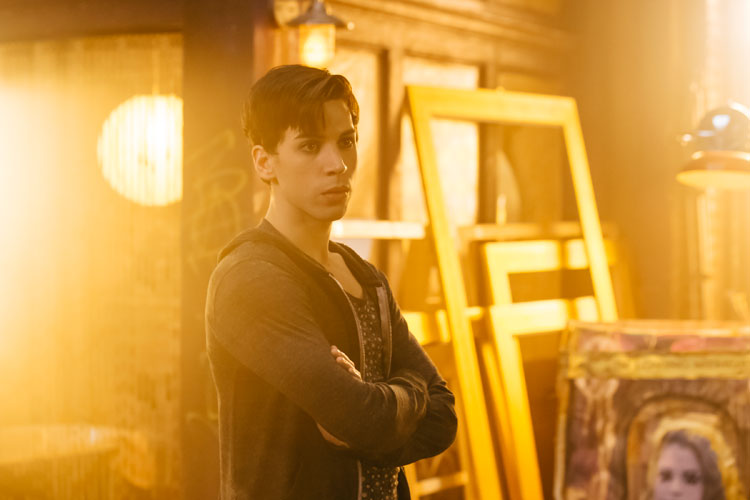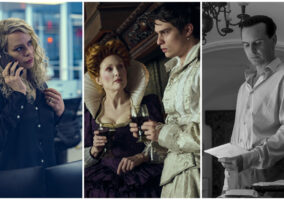 Jordan Gavaris in BBC America’s “Orphan Black”
Jordan Gavaris in BBC America’s “Orphan Black”
Well, there was bound to be a bad episode at some point.
It took the show creators and Tatiana Maslany some time to define Rachel as a character distinct from the other clones, causing us to wonder earlier in the season if perhaps there was a more-than-understandable limit to how many different characters one actress could be expected to play in the same story. With the introduction of Tony, the transgender clone, we think our earlier suspicion has been confirmed. Tatiana deserves all the kudos in the world for the acting high jumps and loop-de-loops she regularly pulls off on this show, but 4, maybe 5 characters are all she and the creators can handle in one season. And we can’t help feeling that the only reason Tony is transgender is because they’ve run out of ways to make cisgender clone women distinct from each other when the same actress has played … what? Seven or eight of them by now? They’ve run out of wigs and believable accents, so they taped some facial hair on her? That’s how it came across to us.
And we don’t quite know how to say this, but we have to because it’s central to the audience accepting Tony as both a distinct character and as a member of clone club: He did not look remotely transgender to us. He looked like a cisgender woman with a shitty fake goatee glued onto her chin. We realize there’s a whole range of gender variations out there and that “transgender” can’t be defined solely by people who present as one gender or another, but they made a point of showing us (rather clumsily, by zooming in on Tony’s crotch) that he’s fully transitioned and taking testosterone. We saw his entire body in a tight tank top and underwear and aside from the potato in his pants, there was not one thing to differentiate him physically from Sarah. Regardless of the rainbow of gender variations out in the world, a post-transition transgender man is not likely to look physically exactly the same as his cisgender twin sister, except with slightly thicker eyebrows. And along with the confusing and somewhat poor introduction of this character comes a set of questions we’re not sure the creators are prepared to answer.
“Just another variation in my sister’s skin,” says Felix about Tony. But wait just a minute here. As we noted last week, the old “nature vs. nurture” debate is central to this story. But with a gay clone and now a transgender one introduced, the creators are coming down pretty hard on the whole “nurture” side of the argument about human sexual orientation and gender variations. That’s a very bold point to be making – and it seems like one of those points they need to address very soon. They have a perfect character to voice these questions in Felix, because he’s both gay and not a clone, which makes him the most likely of the characters to point this out. Of course, Cosima should be pretty interested in this question as well, but we understand why it’s not high on her list of concerns at the moment. Has Cosima ever mentioned anything about the origins of her gayness vis a vis her clone sisters? We can’t remember. And the Felix kiss was borderline offensive in its weirdness – not because he kissed a transgender man, but because he kissed one that looks exactly like his sister. What was the point of that moment? We love that the show is so unabashedly queer, but when you put gay and transgender people in a story like this one, you better have a game plan as to what you’re trying to say about their origins.
But regardless of the questions we might have about these things, and the problems we have with how Tony was presented, our real issue with this episode came down to plotting and pacing. We spent a lot of time on a poorly presented new character, only to shuffle him out of the story for now. Tony’ will have a part to play down the line, we’re sure, but we’ve already got a ridiculous number of plates spinning on poles right now, not the least of which is Helena going missing with no one- not even the cop – particularly concerned that they let a psychopath wander off. And while it’s fun to see Cosima get her gaming nerd on and then get high with Delphine, after sort of breaking up with her (again) and making up with her (again), there are way too many plot lines going on for these kinds of indulgences. All this time spent on Cosima having fun and Tony swaggering around Felix’s apartment, with revelations like “Paul is a ghost,” or “you were all designed to be barren,” just dropped into the story. It seems to us that this season might have been better served shelving the entire Helena/Prolethians arc for a while and concentrating solely on the goings-on at Dyad, since that’s clearly where all the story’s happening at the moment.
But we’re thrilled to find that what we said last week came true: the road to Donny and Alison’s reconciliation is paved with the bodies of people they killed. Also: Kristian Bruun is the CUTEST little baby bear on TV, and the line of the week goes to Alison upon viewing the dead body in her car’s trunk: “This is not at all well-wrapped!” Having said that, it’s time to integrate Alison back into the story. Her entire arc this season has been about her home life and personal problems. It’s helped define her better than almost all the other characters, but she’s not actually doing anything in the story. We suppose getting rid of the body will have some repercussions, especially if it’s found and identified after Rachel went around telling people he died of a heart attack, but she’s too isolated from everything important. We love seeing Art and Felix go all Batman and Robin as the protectors of Clone Club. Now it’s time to bring Alison and Donnie fully into the fold and part of the team.
We didn’t expect the story to wrap up in any way this season, but with only two episodes left before the season finale, we fear they’re going to end it with far too many meandering plot lines. The bane of almost every conspiracy-minded sci-fi show, from The X-Files to Lost to Fringe, has been the piling on of far too many characters, plot lines and questions – and those are only the successful examples. Over and over again, TV history has shown us shows that collapsed under the weight of a story trying to do too many things at once while keeping an audience eternally engaged and guessing. Pull back on the throttle, Orphan Black.
Photo Credit: Steve Wilkie for BBC AMERICA]
Orange is the New Black: Season 2, Eps 1-3 Next Post:
Lucy Liu in Vivienne Westwood at the 2014 Tony Awards
Please review our Community Guidelines before posting a comment. Thank you!



